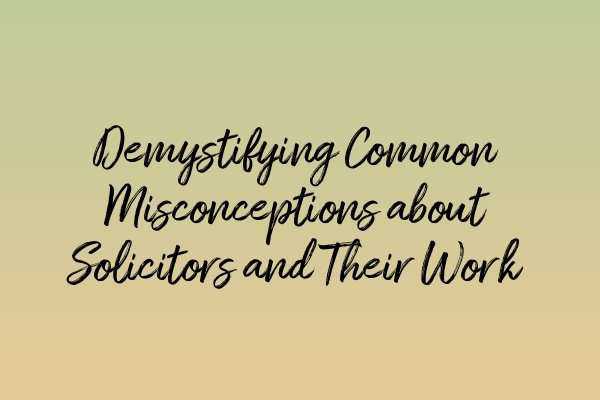Demystifying Common Misconceptions about Solicitors and Their Work
When it comes to the legal profession, there are many misconceptions and stereotypes that surround solicitors and their work. These misconceptions often stem from popular culture, media portrayals, and a lack of understanding about the actual scope of a solicitor’s role. In this article, we aim to demystify some of the most common misconceptions and shed light on the truth behind solicitors and their work.
Solicitors Are Only Involved in Courtroom Dramas
One of the biggest misconceptions about solicitors is that they are constantly involved in dramatic courtroom battles, akin to what we see on television or in movies. While solicitors do have the opportunity to represent clients in court, their work is far from being solely centered around high-profile trials.
In reality, a significant part of a solicitor’s work takes place outside the courtroom. They often spend time conducting research, drafting legal documents, providing legal advice to clients, and negotiating settlements. This behind-the-scenes work is crucial in ensuring the smooth progression of legal matters and achieving favorable outcomes for clients.
If you’re interested in learning more about the realities of courtroom battles, you may find our article on Cross-Examination Techniques: Mastering the Art of Questioning helpful.
All Solicitors Are the Same
Another common misconception is that all solicitors are the same, with identical skills and areas of expertise. In reality, solicitors can specialize in various areas of law, such as criminal law, family law, corporate law, and more. This specialization allows them to develop in-depth knowledge and skills in their chosen field.
When seeking legal advice or representation, it is essential to find a solicitor who specializes in the relevant area of law. By choosing a specialist, you can benefit from their expertise and experience in handling cases similar to yours, increasing the likelihood of a successful outcome.
If you’re considering a career in criminal law, we recommend reading our article on SQE Prep: Tips and Tricks to Excel in Criminal Law for valuable insights and resources.
Solicitors Are Expensive and Only for the Wealthy
Many people believe that solicitors are exorbitantly expensive and only cater to the wealthy. While it is true that legal services can come with a cost, the perception that solicitors are unaffordable for the majority is a misconception.
Solicitors understand the importance of providing access to justice for all individuals, regardless of their financial situation. As such, many solicitors offer a range of fee structures, including fixed fees, hourly rates, and even pro bono services for those who cannot afford legal representation.
If you’re interested in exploring the financial aspects of pursuing a career in law, you may find our article on SQE Prep Made Easy: Strategies and Resources helpful in understanding the various avenues available to fund your legal education.
Solicitors Are Only Needed for Criminal Cases
Contrary to popular belief, solicitors are not only needed for criminal cases. While criminal law is undoubtedly an area where solicitors play a significant role, they are also involved in various other legal matters.
Solicitors assist individuals and businesses with matters such as contract negotiations, property transactions, wills and probate, employment disputes, and more. Their expertise extends beyond the courtroom, encompassing a wide range of legal issues that individuals and organizations encounter in their day-to-day lives.
For a deeper understanding of the complexities of private prosecutions, we recommend reading our article on Private Prosecutions: Exploring Non-Governmental Prosecutions in Criminal Cases.
Solicitors Can’t Be Trusted
One of the most unfair misconceptions about solicitors is that they cannot be trusted. This misconception may stem from cases where solicitors have been involved in misconduct or unethical behavior. However, it is important to remember that these instances are exceptions rather than the norm.
The legal profession is governed by strict regulatory bodies, such as the Solicitors Regulation Authority (SRA), which ensures that solicitors adhere to high ethical and professional standards. Solicitors also have a duty to their clients to act in their best interests and maintain client confidentiality.
If you have concerns about the ethics of solicitors, it may be helpful to familiarize yourself with the SRA’s Code of Conduct, which outlines the professional obligations that solicitors must follow.
By dispelling these common misconceptions and gaining a better understanding of the role of solicitors, you can make more informed decisions when seeking legal advice or considering a career in law. Remember, solicitors play a vital role in upholding justice and providing legal assistance to individuals and organizations in need.
If you’re interested in exploring the intersection of criminal law and national security, our article on Terrorism and Criminal Law: Balancing National Security with Justice might be of interest to you.


Leave a Reply